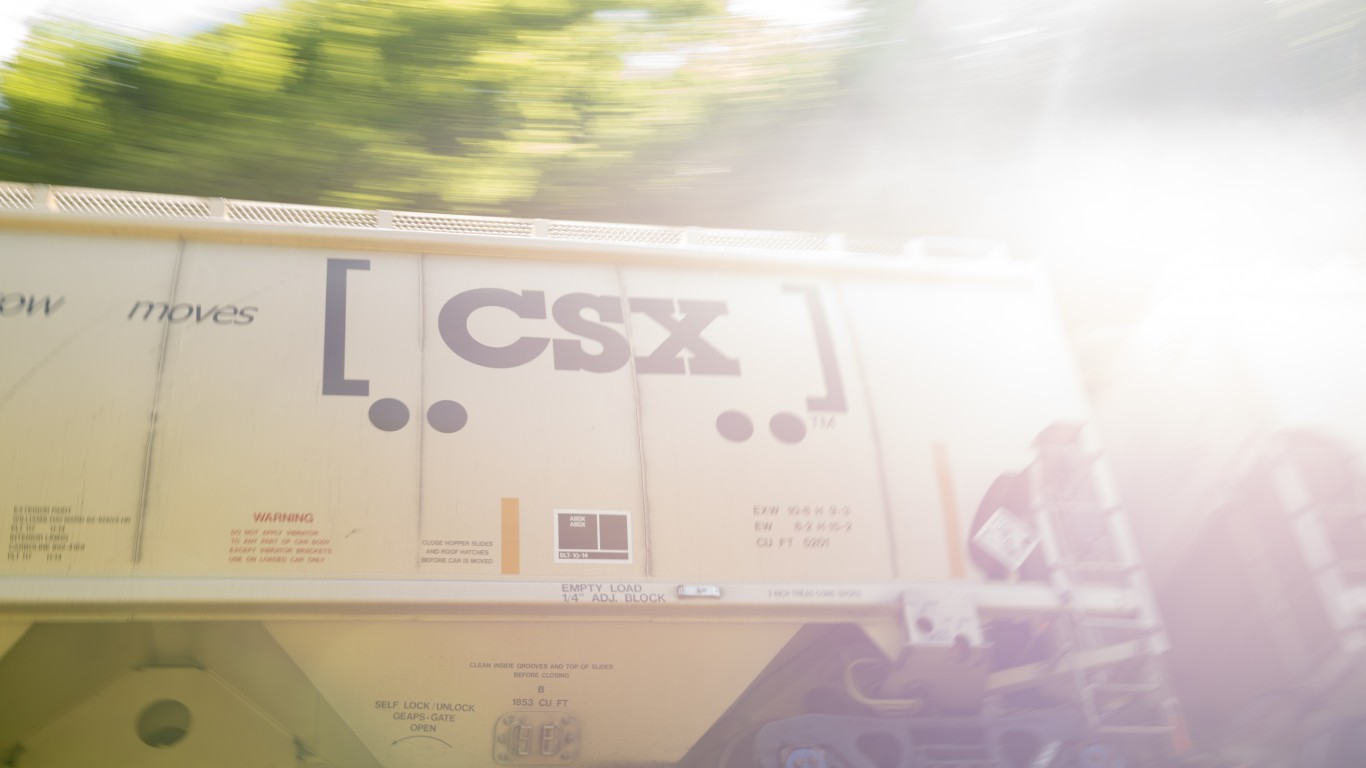Transportation
Customer Service, More New Cars Have CSX Stock Riding High

Published:

When Jim Foote, the chief executive of CSX Corp. (NASDAQ: CSX), looks at his railroad and how it has performed during the economic recession associated with the coronavirus pandemic, he likes what he sees.
“The railroad is running good despite all of the confusion associated with the economy right now, but we have adapted very well,” he said last week in a presentation to the Deutsche Bank 2020 Global Industrials and Materials Summit Conference.
He said he was more confident now than he was a month ago.
Even before the pandemic hit, the operations team had been discussing strategies for keeping costs down while maintaining the ability to handle growth opportunities, Foote said at the conference, which was held remotely.
“The operating team has done an amazing job, keeping train lengths up, utilizing distributed power, all of these strategies that we’ve talked about in the past,” he said.
CSX has targeted the trucking industry as its top competitor and has set a goal of taking market share back. The company has said repeatedly that railroads lost market share to trucks because of poor service quality. Even though rail freight service could be cheaper than truck freight service, customers were willing to pay a premium for reliability.
The CSX approach to customer service used to be based on vague promises that often went unmet, Foote said. The pitch went something like this:
We’ll move your stuff for you. It’ll be there sometime in the next three to seven days. And we do that about 50% of the time, and the 50% of the time where we fail in the three to seven days, I don’t have a clue when it’s going to get there. I probably don’t even have a clue of where your car is.
Now CSX has tracking technology that allows the customer to see where its shipment is. Establishing the rail company as reliable, Foote said, allows it to sell the customer on its lower cost, compared to trucking.
In the past, he said, the company cut back on service in times of economic distress. Now it will not cut back on quality but instead will look for cost savings.
“The business environment for basically all our customers is challenged right now,” Foote said. “And I have a product that I can sell to those people that is reliable and historically, just based on physics, cheaper.”
He added: “I view this as a period of opportunity. And so, we are working diligently to try to grow on our business.”
As the economy is reopening, CSX expectations are rising. The company is seeing gains, especially with the resumption of automobile production. It presents a twofold business opportunity because automakers ship completed cars via rail and the metals, plastics and chemicals associated with car production are moved to assembly plants via rail.
Trains magazine said last week that railroad volumes are beginning to show signs of recovery, especially because of the resumption of auto production.
Canadian National Railway (NYSE: CNI) is seeing modest but uneven improvement in volumes from week to week. “This tells us that the recovery will be slow, probably choppy, and it will take a while for the improvement in demand to stick,” chief financial officer Ghislain Houle said, according to Trains.
Recent rail volume data from the Association of American Railroads shows U.S. rail traffic has been trending upward, although it is unclear whether this will be a long-term trend. U.S. weekly rail volumes totaled 433,171 carloads and intermodal units for the week ending June 6. This is a 16.5% decrease from the same period in 2019, but 9.5% higher than the week ending May 30.
With the economy reopening, CSX stock has shown improvement. Monday’s closing price of $70.15 was up nearly 50% from its March 23 pandemic plunge to $47.49.
Last week, RBC Capital reiterated its Hold rating for the railroad operator with a price target of $73. RBC analyst Walter Spracklin expects second-quarter earnings per share (EPS) of $1. The first-quarter earnings report recorded EPS of $1.
Earlier this month, two other analysts raised the price target for the transportation service company. BMO Capital Markets increased its target to $75 from $71. Barclays boosted its price target to $76 from $67.
At Barclays, analyst Brandon Oglenski likes CSX’s moves to lower costs. “While difficult to detect since the beginning of freight market challenges last year and continuing headwinds during the pandemic, we suspect CSX’s strategy to leverage lower cost and improve service outcomes will lead to future volume expansion,” he said.
In early trading Tuesday, CSX shares were up about 2.5%.
Retirement planning doesn’t have to feel overwhelming. The key is finding expert guidance—and SmartAsset’s simple quiz makes it easier than ever for you to connect with a vetted financial advisor.
Here’s how it works:
Why wait? Start building the retirement you’ve always dreamed of. Click here to get started today!
Thank you for reading! Have some feedback for us?
Contact the 24/7 Wall St. editorial team.